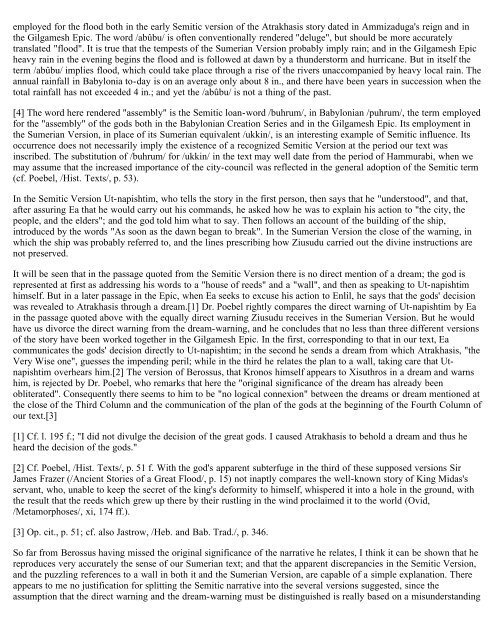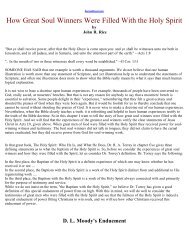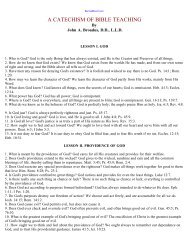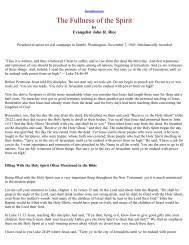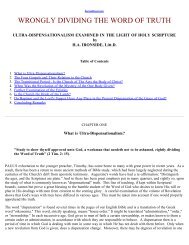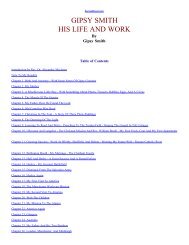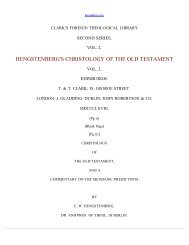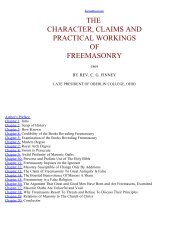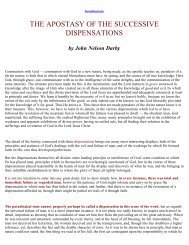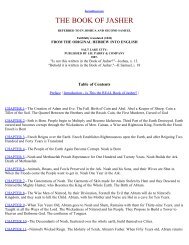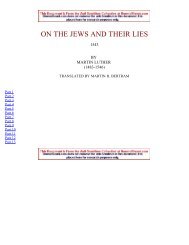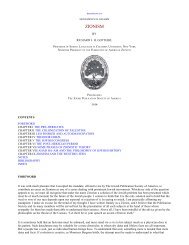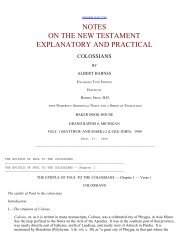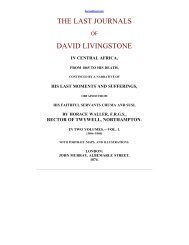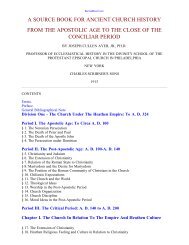Legends of Babylon and Egypt in Relation to Hebrew Tradition.pdf
Legends of Babylon and Egypt in Relation to Hebrew Tradition.pdf
Legends of Babylon and Egypt in Relation to Hebrew Tradition.pdf
You also want an ePaper? Increase the reach of your titles
YUMPU automatically turns print PDFs into web optimized ePapers that Google loves.
employed for the flood both <strong>in</strong> the early Semitic version <strong>of</strong> the Atrakhasis s<strong>to</strong>ry dated <strong>in</strong> Ammizaduga's reign <strong>and</strong> <strong>in</strong><br />
the Gilgamesh Epic. The word /abûbu/ is <strong>of</strong>ten conventionally rendered "deluge", but should be more accurately<br />
translated "flood". It is true that the tempests <strong>of</strong> the Sumerian Version probably imply ra<strong>in</strong>; <strong>and</strong> <strong>in</strong> the Gilgamesh Epic<br />
heavy ra<strong>in</strong> <strong>in</strong> the even<strong>in</strong>g beg<strong>in</strong>s the flood <strong>and</strong> is followed at dawn by a thunders<strong>to</strong>rm <strong>and</strong> hurricane. But <strong>in</strong> itself the<br />
term /abûbu/ implies flood, which could take place through a rise <strong>of</strong> the rivers unaccompanied by heavy local ra<strong>in</strong>. The<br />
annual ra<strong>in</strong>fall <strong>in</strong> <strong>Babylon</strong>ia <strong>to</strong>-day is on an average only about 8 <strong>in</strong>., <strong>and</strong> there have been years <strong>in</strong> succession when the<br />
<strong>to</strong>tal ra<strong>in</strong>fall has not exceeded 4 <strong>in</strong>.; <strong>and</strong> yet the /abûbu/ is not a th<strong>in</strong>g <strong>of</strong> the past.<br />
[4] The word here rendered "assembly" is the Semitic loan-word /buhrum/, <strong>in</strong> <strong>Babylon</strong>ian /puhrum/, the term employed<br />
for the "assembly" <strong>of</strong> the gods both <strong>in</strong> the <strong>Babylon</strong>ian Creation Series <strong>and</strong> <strong>in</strong> the Gilgamesh Epic. Its employment <strong>in</strong><br />
the Sumerian Version, <strong>in</strong> place <strong>of</strong> its Sumerian equivalent /ukk<strong>in</strong>/, is an <strong>in</strong>terest<strong>in</strong>g example <strong>of</strong> Semitic <strong>in</strong>fluence. Its<br />
occurrence does not necessarily imply the existence <strong>of</strong> a recognized Semitic Version at the period our text was<br />
<strong>in</strong>scribed. The substitution <strong>of</strong> /buhrum/ for /ukk<strong>in</strong>/ <strong>in</strong> the text may well date from the period <strong>of</strong> Hammurabi, when we<br />
may assume that the <strong>in</strong>creased importance <strong>of</strong> the city-council was reflected <strong>in</strong> the general adoption <strong>of</strong> the Semitic term<br />
(cf. Poebel, /Hist. Texts/, p. 53).<br />
In the Semitic Version Ut-napishtim, who tells the s<strong>to</strong>ry <strong>in</strong> the first person, then says that he "unders<strong>to</strong>od", <strong>and</strong> that,<br />
after assur<strong>in</strong>g Ea that he would carry out his comm<strong>and</strong>s, he asked how he was <strong>to</strong> expla<strong>in</strong> his action <strong>to</strong> "the city, the<br />
people, <strong>and</strong> the elders"; <strong>and</strong> the god <strong>to</strong>ld him what <strong>to</strong> say. Then follows an account <strong>of</strong> the build<strong>in</strong>g <strong>of</strong> the ship,<br />
<strong>in</strong>troduced by the words "As soon as the dawn began <strong>to</strong> break". In the Sumerian Version the close <strong>of</strong> the warn<strong>in</strong>g, <strong>in</strong><br />
which the ship was probably referred <strong>to</strong>, <strong>and</strong> the l<strong>in</strong>es prescrib<strong>in</strong>g how Ziusudu carried out the div<strong>in</strong>e <strong>in</strong>structions are<br />
not preserved.<br />
It will be seen that <strong>in</strong> the passage quoted from the Semitic Version there is no direct mention <strong>of</strong> a dream; the god is<br />
represented at first as address<strong>in</strong>g his words <strong>to</strong> a "house <strong>of</strong> reeds" <strong>and</strong> a "wall", <strong>and</strong> then as speak<strong>in</strong>g <strong>to</strong> Ut-napishtim<br />
himself. But <strong>in</strong> a later passage <strong>in</strong> the Epic, when Ea seeks <strong>to</strong> excuse his action <strong>to</strong> Enlil, he says that the gods' decision<br />
was revealed <strong>to</strong> Atrakhasis through a dream.[1] Dr. Poebel rightly compares the direct warn<strong>in</strong>g <strong>of</strong> Ut-napishtim by Ea<br />
<strong>in</strong> the passage quoted above with the equally direct warn<strong>in</strong>g Ziusudu receives <strong>in</strong> the Sumerian Version. But he would<br />
have us divorce the direct warn<strong>in</strong>g from the dream-warn<strong>in</strong>g, <strong>and</strong> he concludes that no less than three different versions<br />
<strong>of</strong> the s<strong>to</strong>ry have been worked <strong>to</strong>gether <strong>in</strong> the Gilgamesh Epic. In the first, correspond<strong>in</strong>g <strong>to</strong> that <strong>in</strong> our text, Ea<br />
communicates the gods' decision directly <strong>to</strong> Ut-napishtim; <strong>in</strong> the second he sends a dream from which Atrakhasis, "the<br />
Very Wise one", guesses the impend<strong>in</strong>g peril; while <strong>in</strong> the third he relates the plan <strong>to</strong> a wall, tak<strong>in</strong>g care that Utnapishtim<br />
overhears him.[2] The version <strong>of</strong> Berossus, that Kronos himself appears <strong>to</strong> Xisuthros <strong>in</strong> a dream <strong>and</strong> warns<br />
him, is rejected by Dr. Poebel, who remarks that here the "orig<strong>in</strong>al significance <strong>of</strong> the dream has already been<br />
obliterated". Consequently there seems <strong>to</strong> him <strong>to</strong> be "no logical connexion" between the dreams or dream mentioned at<br />
the close <strong>of</strong> the Third Column <strong>and</strong> the communication <strong>of</strong> the plan <strong>of</strong> the gods at the beg<strong>in</strong>n<strong>in</strong>g <strong>of</strong> the Fourth Column <strong>of</strong><br />
our text.[3]<br />
[1] Cf. l. 195 f.; "I did not divulge the decision <strong>of</strong> the great gods. I caused Atrakhasis <strong>to</strong> behold a dream <strong>and</strong> thus he<br />
heard the decision <strong>of</strong> the gods."<br />
[2] Cf. Poebel, /Hist. Texts/, p. 51 f. With the god's apparent subterfuge <strong>in</strong> the third <strong>of</strong> these supposed versions Sir<br />
James Frazer (/Ancient S<strong>to</strong>ries <strong>of</strong> a Great Flood/, p. 15) not <strong>in</strong>aptly compares the well-known s<strong>to</strong>ry <strong>of</strong> K<strong>in</strong>g Midas's<br />
servant, who, unable <strong>to</strong> keep the secret <strong>of</strong> the k<strong>in</strong>g's deformity <strong>to</strong> himself, whispered it <strong>in</strong><strong>to</strong> a hole <strong>in</strong> the ground, with<br />
the result that the reeds which grew up there by their rustl<strong>in</strong>g <strong>in</strong> the w<strong>in</strong>d proclaimed it <strong>to</strong> the world (Ovid,<br />
/Metamorphoses/, xi, 174 ff.).<br />
[3] Op. cit., p. 51; cf. also Jastrow, /Heb. <strong>and</strong> Bab. Trad./, p. 346.<br />
So far from Berossus hav<strong>in</strong>g missed the orig<strong>in</strong>al significance <strong>of</strong> the narrative he relates, I th<strong>in</strong>k it can be shown that he<br />
reproduces very accurately the sense <strong>of</strong> our Sumerian text; <strong>and</strong> that the apparent discrepancies <strong>in</strong> the Semitic Version,<br />
<strong>and</strong> the puzzl<strong>in</strong>g references <strong>to</strong> a wall <strong>in</strong> both it <strong>and</strong> the Sumerian Version, are capable <strong>of</strong> a simple explanation. There<br />
appears <strong>to</strong> me no justification for splitt<strong>in</strong>g the Semitic narrative <strong>in</strong><strong>to</strong> the several versions suggested, s<strong>in</strong>ce the<br />
assumption that the direct warn<strong>in</strong>g <strong>and</strong> the dream-warn<strong>in</strong>g must be dist<strong>in</strong>guished is really based on a misunderst<strong>and</strong><strong>in</strong>g


